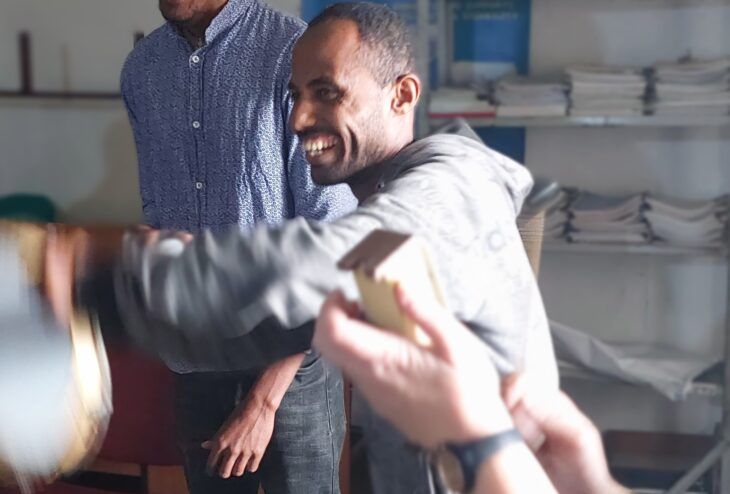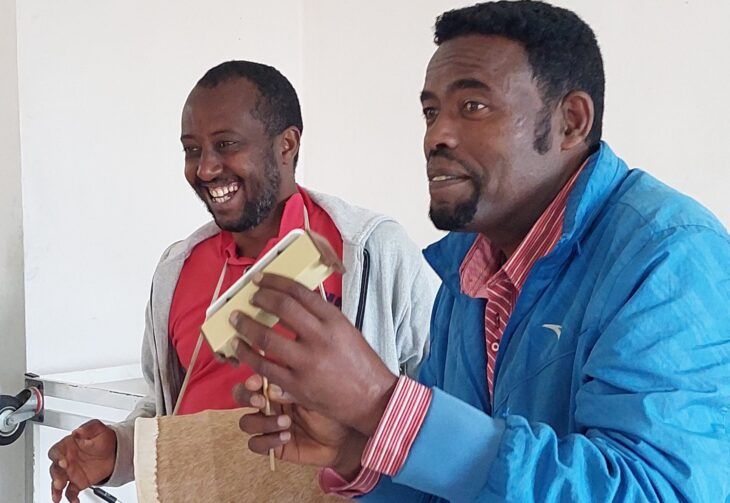Extending the reach of music in Ethiopia
Ethiopia
- Adults
- Disability
- Mental health
- Young people

In 2018, we delivered our first Introductory Training activity in Ethiopia, in a groundbreaking project of firsts. Yet after our follow-up visit in 2019, the onset of the Covid-19 pandemic prevented us from returning to the country. We were forced to wait until the situation changed, providing remote support wherever possible to help our Partners continue using music in the care they provided.
Thankfully, with the challenges of international travel diminished, we were once again able to send a volunteer team to Ethiopia in October 2022. Two music therapists (and Advisory Panel members), Erin Williams-Jones and Emma Britton traveled to the capital, Addis Ababa, to offer guidance, support and encouragement to our Partners in three care settings: Hospice Ethiopia, FENAID and Gefersa Mental Health Rehabilitation Centre. Alongside this sustainability activity, Erin and Emma also spent time in a fourth setting – Lebeza Psychiatry Clinic to provide tailored training to the staff there.
Over four weeks Erin and Emma worked alongside caregivers in each of the care settings, troubleshooting problems and challenges and exploring how musical activities can help strengthen care.
How the team, Erin and Emma, interacted with the patients were amazing. Even with the language barrier, the interaction was really nice.
Caregiver, Hospice Ethiopia

In addition to honing their skills in music sessions, a key aim was to build on our Partners’ confidence in leading their own music sessions independently. The immediate success of their efforts is clear. When asked for feedback following the completion of the training and support activities, 91% of caregivers shared that they were left feeling proud of their music sessions, they are now more confident and they enjoy working in their job more.
I was learnt new skills how to keep the patient with music how to manage their behaviour with music.
Caregiver, Lebeza Psychiatry Clinic
The positive effect of the music was also evident for the people accessing care at the four settings, with caregivers commenting on seeing significant differences in the mood of their beneficiaries.
[I saw] young people who had never spoken before express their feelings through music.
Caregiver, FENAID

Even if they haven’t laughed before they have started to laugh currently.
Caregiver, Gefersa Mental Health Rehabilitation Centre
In total, 26 caregivers received training and support in their use of music, with more than 300 people gaining access to music as part of these activities. With many of our Partners having already shown the commitment, courage and dedication continue using music since 2018, the long-term future of music in these four settings – which provide care for more than 2,900 people around the country’s capital – is looking bright.
Related projects
-
On-site skill-sharing: Lebeza Psychiatry Clinic (Addis Ababa) 2022
Ethiopia
- Adults
- Mental health
-
Support visit: Hospice Ethiopia, FENAID and Gefersa Mental Health Rehabilitation Centre (Addis Ababa) 2022
Ethiopia
- Adults
- Disability
- Mental health
- Elderly
